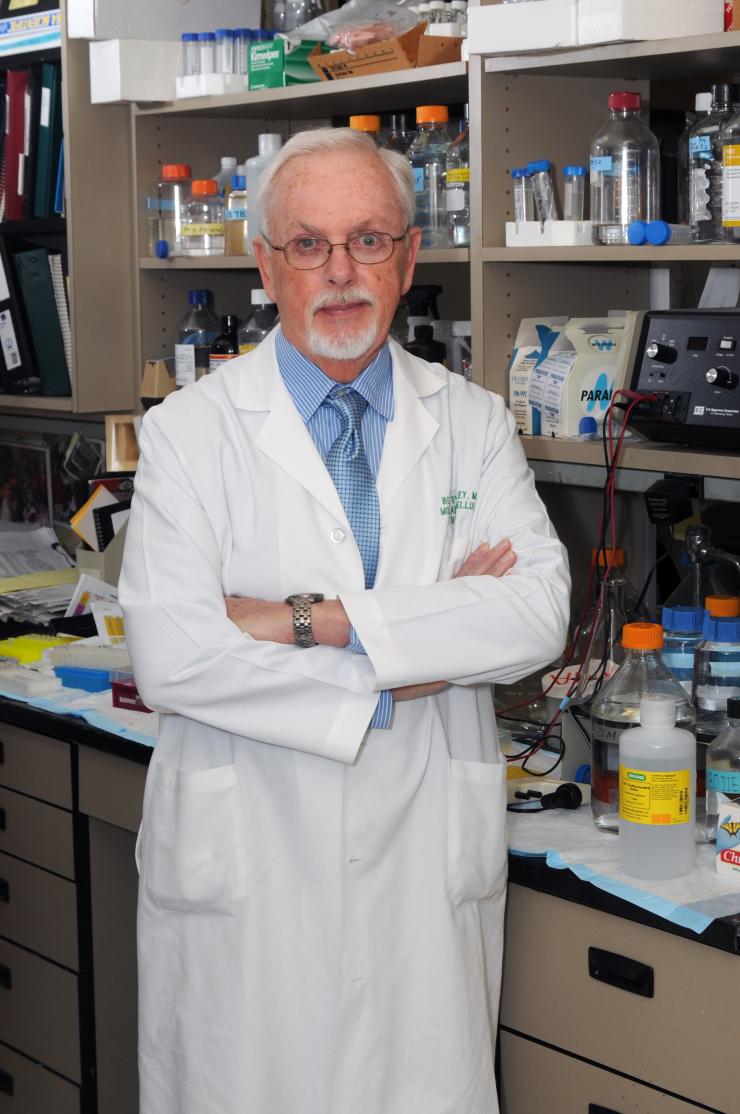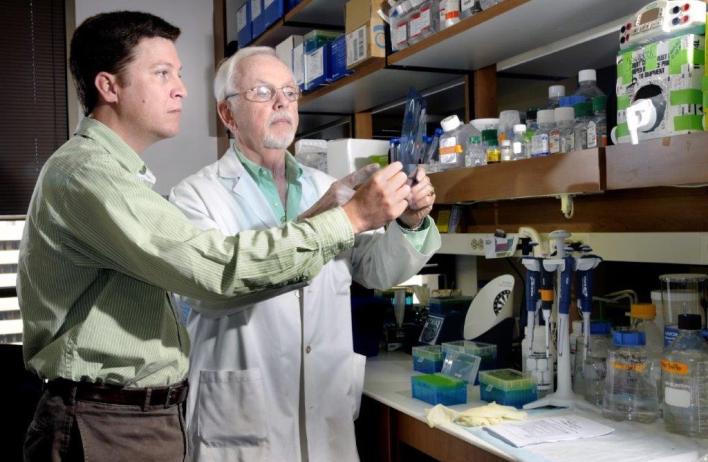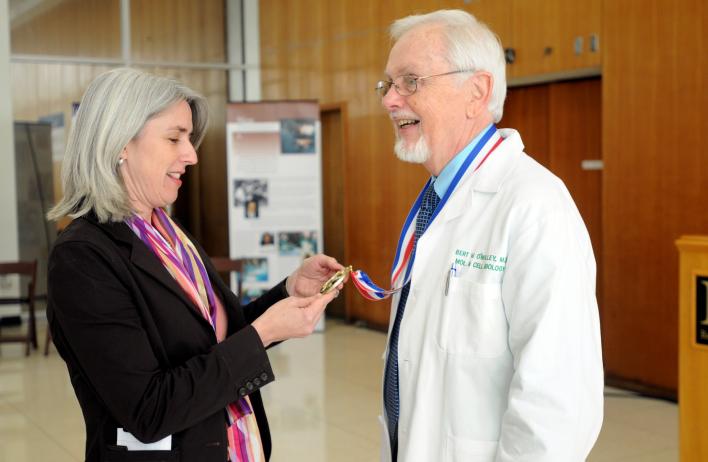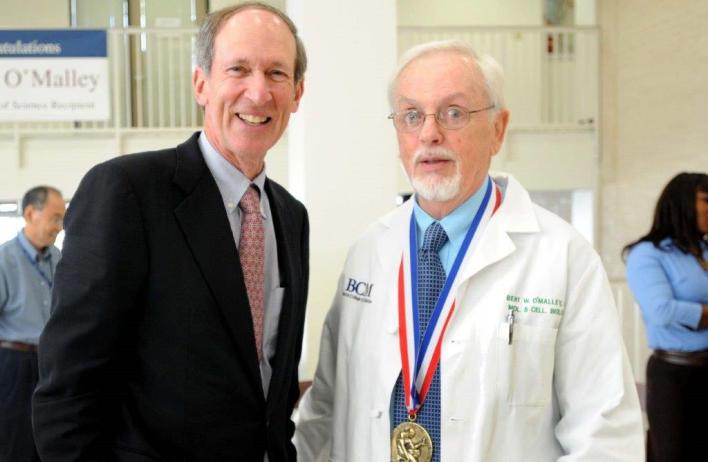Celebration of Life

It is with sadness that we announce the death of Dr. Bert W. O'Malley, Baylor College of Medicine chancellor, and former chair of the Department of Molecular and Cellular Biology. He also served as the associate director of basic research in the Dan L Duncan Comprehensive Cancer Center at Baylor College of Medicine.
Considered the ‘founding father’ in the field of molecular endocrinology, Dr. Bert O’Malley was born in Pittsburgh, Pa. and received his Bachelor of Science degree from the University of Pittsburgh and his medical degree from the University of Pittsburgh School of Medicine. He did his clinical internship and residency training at Duke University Medical Center and spent four years at the National Institutes of Health, where he was head of the Molecular Biology Section of the Endocrine Branch of the National Cancer Institute of the National Institutes of Health.
He then served as the Lucious Birch Professor and Director of the Reproductive Biology Center at Vanderbilt University before joining Baylor College of Medicine as chair of the Department of Molecular and Cellular Biology in 1973, a position he held for 45 years. During his time in this role, the department was routinely listed in the top five in the nation in securing National Institutes of Health funding; more than five times as No. 1. He published more than 700 papers and holds 33 patents in the fields of gene regulation, molecular endocrinology, steroid receptor and coactive action and cell proteomics and metabolism. He founded five companies.
In July 2018, O’Malley was named the fourth chancellor of Baylor College of Medicine and stepped down as chair of the department to assume the role of chancellor, but continued to direct his research lab. As chancellor, he advised the president of Baylor College of Medicine, participated in strategic planning activities and acted as an ambassador for the College. He was a member of the NCI-designated Dan L Duncan Comprehensive Cancer Center at Baylor.
O’Malley changed the understanding of endocrinology in a fundamental way. He focused his research on the molecular mechanisms that guide gene regulation in endocrinology and endocrine cancers, including how hormones, receptors and coactivators contribute to the disease process. His pioneering work in this field has shown that intracellular hormones and cofactors act at the level of DNA to regulate the production of proteins and affect the function of the cell.
Research Highlights
O’Malley’s lab discovered and was the first to solve the structure of a functional receptor-coactivator complex on DNA capable of regulating gene transcription in vitro. In addition, he showed that steroid receptor coactivator-2 (SRC-2), which is highly elevated in a variety of tumors, is likely implicated in metabolic coordination of cancer metastasis, opening the possibility of therapeutically targeting the SRC-2 pathway.
His work with steroid receptor coactivator-3 (SRC-3), a prognostic marker for aggressive human breast cancer, showed that small-molecule inhibitors that directly bind SRC-3 cause selective degradation of the complex, hereby killing cancer cells with no observable toxicity. Small-molecule inhibitors represent a new type of oncologic drugs that target coactivators.
In addition, Dr. O’Malley’s work showed in a mouse model of heart disease, that stimulating SRC-3 with small-molecule MCB-613 initiated a complex cascade of events in tissue repair and modulation of the inflammatory response that reduced fibrosis, attenuating loss of cardiac function after myocardial infarction. These findings open the possibility of novel therapies to regulate the progression of heart failure via SRC-3.
His work also revealed a role for SRC-3 in regulatory immune T cells (Tregs) that promote cancer growth by inhibiting anti-cancer immune responses. He also showed that SRC-3 is significantly enriched in both murine and human Tregs. Inhibiting SRC-3 in Tregs in the lab stopped them from reducing the anti-tumor response, suggesting that modulating SRC-3 in Tregs might help control cancer growth.
Memberships
Dr. O’Malley was a member of the National Academy of Sciences, the National Academy of Medicine, the American Association of Physicians and the National Academy of Inventors. He won the National Medal of Science in 2007 and received more than 65 honors and science prizes in his career.
Dr. O’Malley was a fellow of the American Academy of Arts and Sciences, the American Academy of Microbiology, the American Association for the Advancement of Science and the American Association of Cancer Research. He received honorary doctorate degrees from the Karolinska Institute, New York University, the National University of Ireland, the University of Maryland, the University of Pittsburgh and the University of Athens, Greece.
Awards and Honors
His awards and honors include:
- Ernst Oppenheimer Award
- Gregory Pincus Medal
- Lila Gruber Award
- Borden Award
- Axel Munthe Award
- Bicentennial Medallion of Distinction (University of Pittsburgh)
- Kodak Award
- Doisy Lecture Award
- D.R. Edwards Medal
- E.E.S. Transatlantic Medal
- George W. Beadle Award
- Solomon Berson L. Ad. (Amer. Phy. Soc.), Pioneer Award
- Woods Hole, Biolink Scientist of the Year Award
- Vanderbilt Distinguished Medical Award (Alumni Association)
- Bowman Distinguished Geneticist Award
- Dickson Prize (1979)
- Fred Conrad Koch Medal (1998)
- Rodbell Award (National Institute of Environmental Health Science) (2001)
- Feltrinelli International Prize in Biology (2001)
- Brinker Award in Breast Cancer Research (2001)
- Antonio Feltrinelli International Prize for Biology (2001)
- Induction into the Royal Academy of Medicine (2003)
- Pasarow Award in Cancer Research (2006)
- Carl Hartman Award for Reproductive Research (2007)
- Steven Beering Award in Medical Research (2009)
- Ernst Schering Prize (2011)
- Ipsen Foundation Research Prize in Endocrinology (2013)
- Dale Medal from the Society for Endocrinology (2014)
- Outstanding Innovation Award (End.Soc.) (2015)
- Jensen Lifetime Achievement Award (U.Cinn.) (2018)
- Louisa Gross Horwitz Prize (2018)




Honoring the Life and Legacy
Gifts in Dr. O’Malley’s memory will support two meaningful initiatives that reflect his lifelong dedication to discovery and innovation:
- The Erin O'Malley Endowed Fund in Molecular and Cellular Biology, supporting excellence in research and education.
- The Bert O’Malley Innovation Fund, advancing transformative research within the Department of Molecular and Cellular Biology, which Dr. O’Malley led for more than 45 years.








